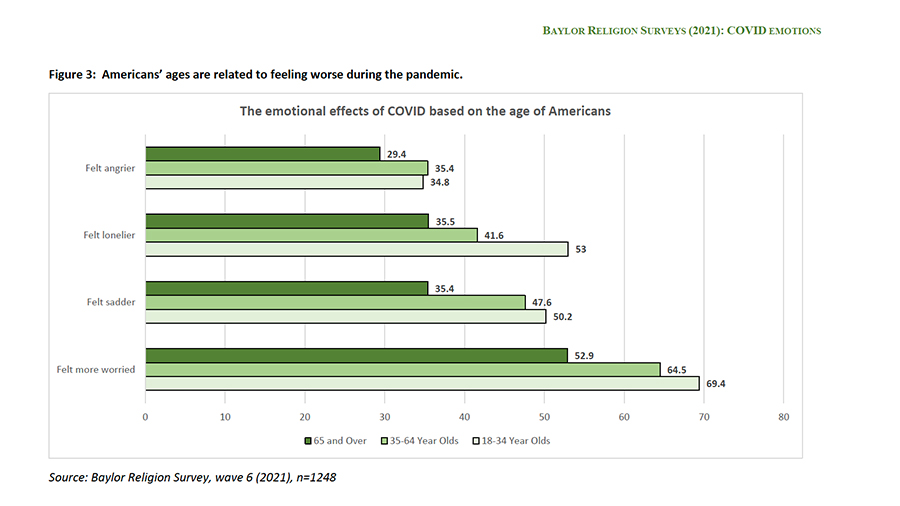Americans Report Pandemic Has Caused Dramatic Negative Toll on Emotions
Results from Baylor Religion Survey Wave 6 data show patterns of negative emotional responses to COVID-19 pandemic
Media Contact: Kaitlyn Rieper, Baylor University Media and Public Relations, 254-405-9110Follow us on Twitter: @BaylorUMedia
WACO, Texas (Sep. 13, 2021) – Findings from the latest national Baylor Religion Survey (BRS) found that the COVID-19 pandemic has made Americans significantly angrier, sadder, lonelier and more worried. Wave 6 of the survey provided Baylor University researchers with a unique opportunity to examine the mental health of the American public by asking individuals to reflect on their emotional state during the pandemic compared to their life before.
Across four emotions — worried, sad, lonely and angry — more than one-third of Americans reported feeling these emotions more strongly compared to before the pandemic. This pattern was particularly apparent for feeling worried, especially for parents with children living at home. And Americans in poor physical health were more likely to experience all four negative emotions compared to those in better health.
“It is not surprising that parents with children also felt more worry. With abrupt school closures and the complete shut-down of social and recreational activities for children, parents had additional reasons to worry about the state of their children’s future and how to manage their care and education on a daily basis while in many cases shifting to remote work,” said Laura Upenieks, Ph.D., assistant professor of sociology at Baylor and BRS researcher.
Young and single adults, Democrats and urban Americans were the groups more likely to experience an increase in negative emotions due to the pandemic. While less likely to be in poor health, young adults — Americans 18-34 years old — in particular experienced increased feelings of loneliness and worry due to the pandemic.
“This group might have borne the brunt of heightened uncertainty as they found themselves trying to attain education or work credentials or trying to establish a career or family life. Such potent disruptions during these formative years, as well as a complete upheaval to their social lives, might have created greater emotional responses,” Upenieks said.
Republicans and Americans in rural areas felt the negative emotional impact of COVID somewhat less. Living in a less population-dense area may have influenced different emotional responses for rural residents, said Rebecca Bonhag, Baylor sociology doctoral candidate and study researcher.
“Rural residents may have felt less at risk for infection or could have a stronger social support network living close by,” Bonhag said. “They are also more likely to be conservative, which ties in with the party affiliation trend we observe from the survey results. Polarized media consumption likely has something to do with the partisan trend.”
BRS researchers are now delving deeper into the causes and effects of these emotional shifts and patterns. With the pandemic continuing to influence day-to-day life, there are concerns that negative emotional responses could continue to impact the lives of Americans.
“If research from the Great Recession of 2007-2009 has taught us anything, the emotional inequalities produced and further exacerbated by the COVID-19 pandemic will continue to reverberate for years to come. Every effort should be made to identify vulnerable groups and provide them adequate resources, like counseling, to manage these negative emotions before they potentially spiral into clinical diagnoses,” Upenieks said.
ABOUT BAYLOR UNIVERSITY
Baylor University is a private Christian University and a nationally ranked research institution. The University provides a vibrant campus community for more than 19,000 students by blending interdisciplinary research with an international reputation for educational excellence and a faculty commitment to teaching and scholarship. Chartered in 1845 by the Republic of Texas through the efforts of Baptist pioneers, Baylor is the oldest continually operating University in Texas. Located in Waco, Baylor welcomes students from all 50 states and more than 90 countries to study a broad range of degrees among its 12 nationally recognized academic divisions.

